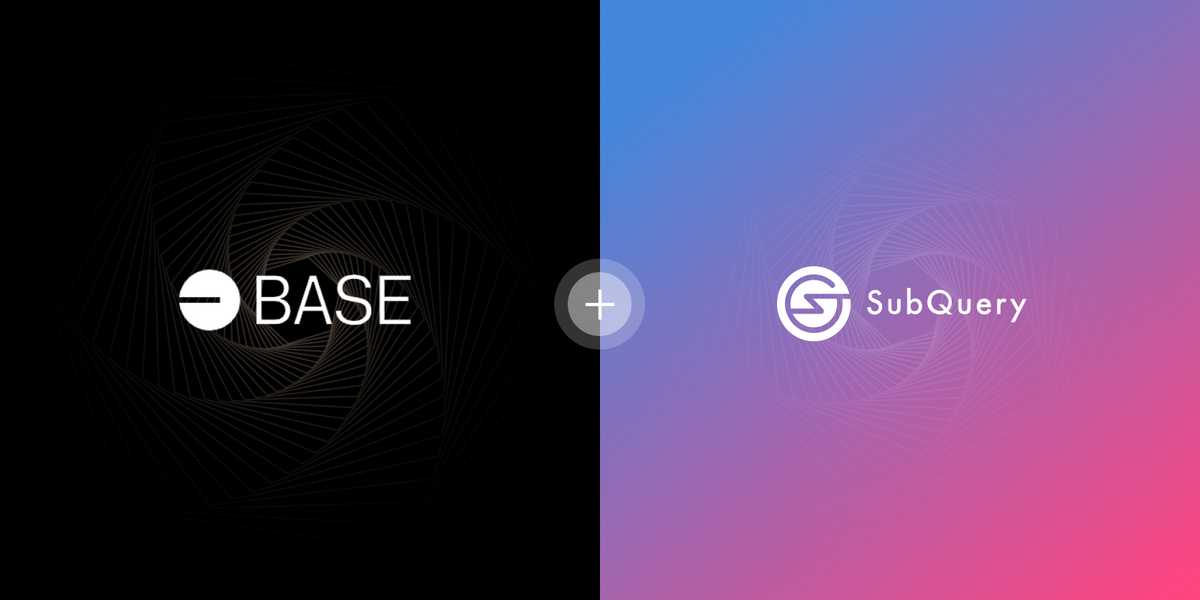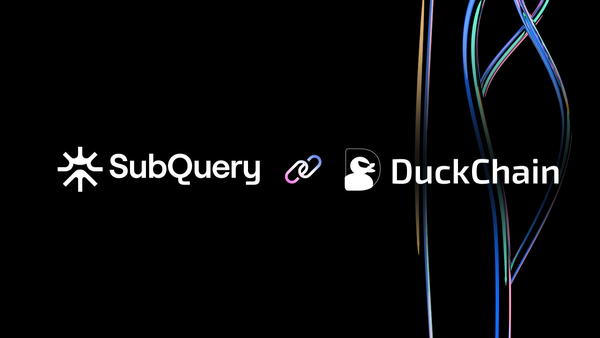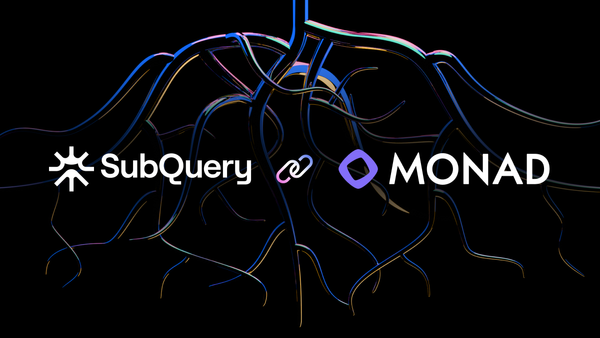Today, we are excited to announce full SubQuery support for both Base’s Mainnet and Goerli testnet, the only indexer that provides both SDK and managed service support. Base is a new Ethereum L2, incubated by Coinbase and built on the open-source OP Stack. SubQuery's indexing support will enable developers building on Base to easily organise and query on-chain data, accelerating development cycles and enabling rapid iteration to help bring the next billion users onchain.
We’re pleased to work with Base to bring SubQuery’s flexible, fast, open, and decentralised data indexing solution that provides blockchain developers with the tools needed to easily organise and query on-chain data for their protocol and applications. Abstracting the backend, SubQuery provides a custom API and lets developers focus on product development and user experience rather than building their own indexing solutions.
“We set out to make Base the most developer-friendly way to build on-chain, that means providing developer tooling and services to make it easy to build, deploy, iterate, and scale your applications on Base. We're happy to see another multi-chain indexer join our ecosystem, and pleased that developers will be able to utilise SubQuery to build next-gen applications onBase.”
— Rowan Stone, Head of BD, Base, and Head of Onchain BD, Coinbase
We’re always striving to provide developers with the most comprehensive and efficient indexing experience possible, including the open-source SDK, tools, documentation, and developer support that the SubQuery ecosystem provides. Base is also supported in SubQuery’s enterprise level managed service, which provides enterprise level infrastructure hosting and handles hundreds of millions of requests each day. SubQuery will also support Base developers with another decentralised indexing alternative with the impending launch of the SubQuery Network. That’s why we’re thrilled to announce our latest integration with one of the most exciting EVM chains in the Web3 space.
“We are excited to offer SubQuery’s flexible, fast, open, and decentralised data indexing solution to the Base community. By abstracting backend intricacies, we empower developers to focus on what matters most: product development and user experience. We are confident that our support of Base will help encourage web3 builders to create the next wave of exciting decentralised applications.”
— Sam Zou, Founder and CEO of SubQuery
Our experience with customers across all verticals in Ethereum, Polygon, Polkadot, Cosmos, Algorand, NEAR and Avalanche (such as wallets, networks, explorers, NFT, DeFi, and scanners, etc.) has helped us build one of the best performing Indexers for developers in web3.
SubQuery is currently focused on decentralising and tokenizing the protocol to build the SubQuery Network. The SubQuery Network will index and service data from projects to the global community in an incentivized and verifiable way and support indexing Base projects, and those from any other supported network from the outset.

Why Use SubQuery?
SubQuery is flexible with the ability to make external API calls or import external libraries from within your mapping functions, and better controls to run your projects in your own infrastructure with automated DOS (denial of service) mitigation controls. Additionally, we have no plans to sunset our managed service.
SubQuery is designed to be fast, this adds up when you’re indexing millions of blocks, and is something to consider when choosing your indexer. SubQuery achieves this by using mulit-threading and optimisation of the store to reduce costly database writes. With faster sync times, developers can iterate faster and deliver features to market quicker.
And finally, in a few months you’ll be able to completely decentralise your SubQuery infrastructure with the SubQuery Network, the future of Web3 infrastructure. The SubQuery Network will index and service your projects data to the global community in an incentivised and verifiable way. It is designed to support any SubQuery project from any supported network including Base, so you can take advantage of the scale of the unified SubQuery Network from launch.
Getting Started with SubQuery and Base
The best way is to start by following our step by step guide using a real world example project. Follow our quick start tutorial to see how to index the total faucets dripped to users from the USDC Faucet contract on Base’s Goerli Testnet in only 15 minutes.
With SubQuery’s Base integration, there are three types of mapping handlers:
- BlockHandler: All blocks and their hash and height
- TransactionHandler: All transactions and their hash, height, and timestamp
- LogHandler: On each and every log that matches optional filter criteria, access various data from the Base logs
We’ve updated the SubQuery Documentation to add Base specific information to the general SubQuery documentation.
SubQuery’s Support for Base
- Advanced Indexing of blocks, transactions, and logs
- A quick start tutorial to see how to index the total faucets dripped to users from the USDC Faucet contract on Base’s Goerli Testnet
- Full support for Base in our free enterprise level managed service
- Example projects for both Base’s Mainnet and Goerli testnet.
- Discord community (including technical support)
About Base
Base is a secure, low-cost, builder-friendly Ethereum L2 built to bring the next billion users onchain.
Base is incubated within Coinbase and plans to progressively decentralise in the years ahead. We believe that decentralisation is critical to creating an open, global crypto economy that is accessible to everyone.
Website | Twitter | Docs | Discord | Github | Blog
About SubQuery
SubQuery is a leading data indexer that gives you fast, reliable, decentralised, and customised APIs for your web3 projects. We empower developers from over 80+ ecosystems including Base, with rich indexed data to allow them to build intuitive and immersive experiences for their users. The SubQuery Network powers your unstoppable apps with a resilient and decentralised infrastructure network. Use our blockchain developer toolkit to build the web3 applications of the future, without wasting time building a custom backend for data processing activities.
Linktree | Website | Discord | Telegram | Twitter | Matrix | LinkedIn | YouTube







